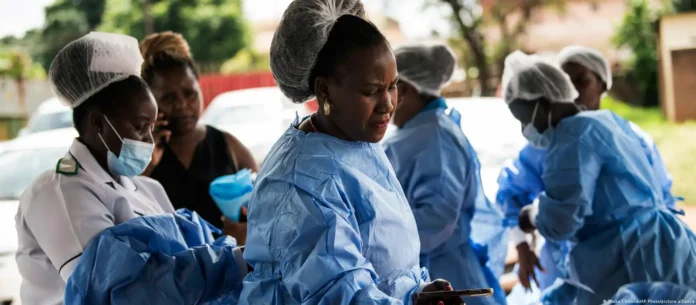A deadly cholera outbreak has struck southern Africa, with health authorities racing to contain the spread of the disease and prevent further casualties. The outbreak has been reported in several countries across the region, including Mozambique, Zimbabwe, and Malawi.
In Mozambique, one of the hardest-hit nations, health officials have confirmed a significant increase in cholera cases in recent weeks. The outbreak has been attributed to contaminated water sources and poor sanitation conditions, which have facilitated the rapid transmission of the bacterium responsible for cholera.
Zimbabwe has also experienced a surge in cholera cases, particularly in densely populated urban areas where access to clean water and sanitation facilities is limited. The country’s health ministry has declared a state of emergency and mobilized resources to combat the outbreak, including deploying medical teams to affected communities and setting up treatment centers to provide care for those infected with the disease.
Similarly, Malawi has reported a rise in cholera cases, with health authorities warning of the potential for further spread if preventive measures are not implemented swiftly. Efforts to contain the outbreak in Malawi have focused on promoting hygiene practices, such as handwashing and safe food handling, as well as providing access to clean water and sanitation services in affected areas.
The cholera outbreak in southern Africa underscores the urgent need for improved water and sanitation infrastructure to prevent similar public health crises in the future. Addressing underlying factors such as inadequate access to clean water, poor sanitation, and overcrowded living conditions is essential to reducing the risk of cholera transmission and safeguarding the health of vulnerable populations.
International aid agencies and humanitarian organizations have stepped up their support to assist affected countries in responding to the outbreak. Emergency medical supplies, including oral rehydration salts, intravenous fluids, and antibiotics, have been dispatched to affected areas to treat cholera patients and prevent further spread of the disease.
As efforts to contain the outbreak continue, health authorities are urging residents to remain vigilant and take precautions to protect themselves and their communities from cholera. By promoting good hygiene practices and ensuring access to clean water and sanitation facilities, southern Africa can mitigate the impact of the current outbreak and prevent future outbreaks of waterborne diseases.
The cholera outbreak, which has primarily affected countries like Mozambique, Zimbabwe, and Malawi, has raised concerns about public health infrastructure and sanitation in the region. Cholera is a waterborne disease, often linked to contaminated water sources and poor hygiene practices. With the ongoing challenges of inadequate access to clean water and sanitation facilities in many areas of southern Africa, the risk of cholera transmission remains high.
Efforts to combat the outbreak are underway, with local health authorities working alongside international organizations such as the World Health Organization (WHO) and UNICEF to provide medical assistance, clean water, and sanitation services to affected communities. Rapid response teams have been deployed to affected areas to treat those infected, distribute oral rehydration salts, and promote hygiene and sanitation practices to prevent further spread of the disease.
Despite these efforts, the situation remains critical, with healthcare facilities overwhelmed by the influx of cholera patients. The outbreak underscores the need for sustained investment in public health infrastructure, including access to clean water, improved sanitation, and healthcare services, to prevent future outbreaks and protect vulnerable populations from infectious diseases.
In addition to addressing immediate medical needs, authorities are also focusing on long-term strategies to improve water and sanitation infrastructure, enhance disease surveillance systems, and strengthen community health education programs. These efforts aim to build resilience against future outbreaks and ensure that communities are better equipped to respond to public health emergencies.
The cholera outbreak serves as a stark reminder of the interconnectedness of health and development, highlighting the importance of addressing underlying social, economic, and environmental determinants of health to achieve sustainable progress. As the international community rallies to support affected countries in their response efforts, the focus remains on saving lives, mitigating the impact of the outbreak, and building stronger health systems to protect against future health threats.

